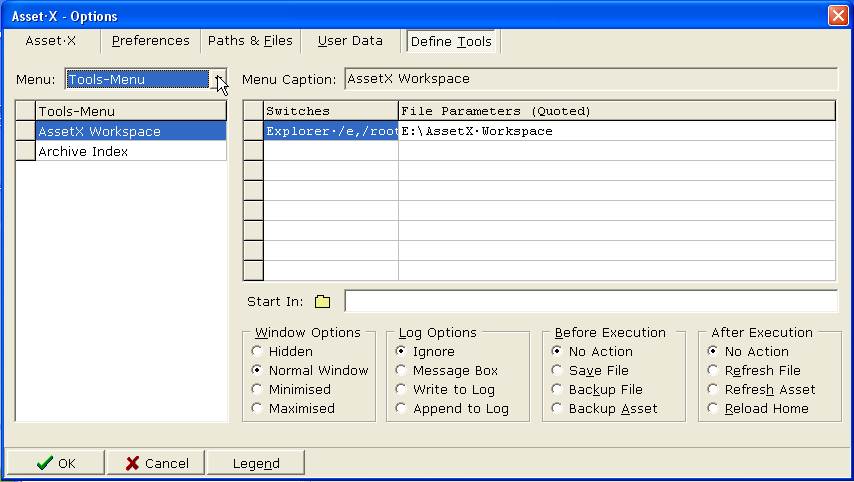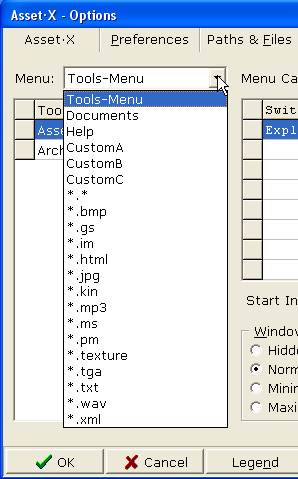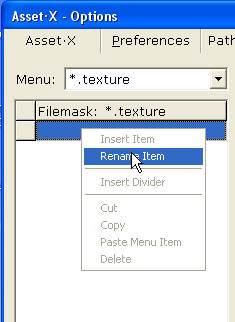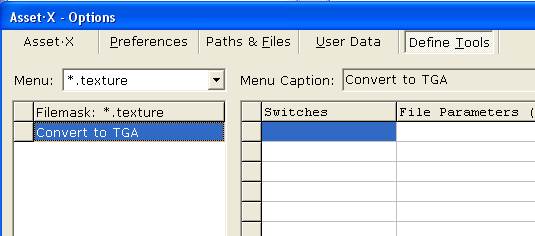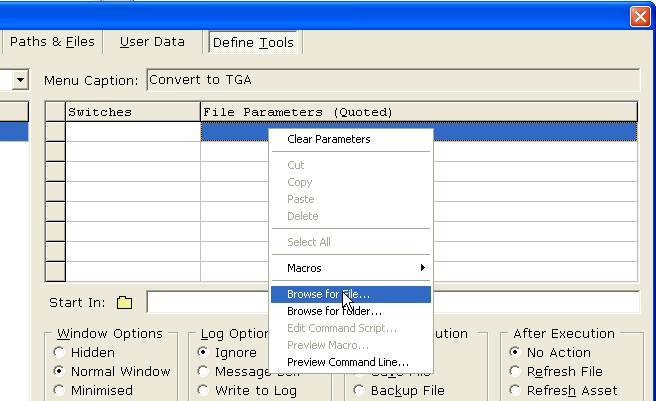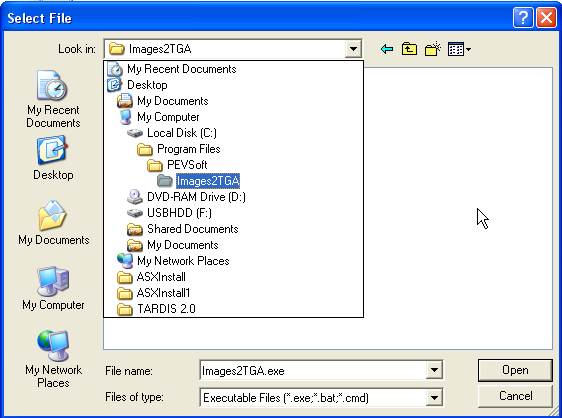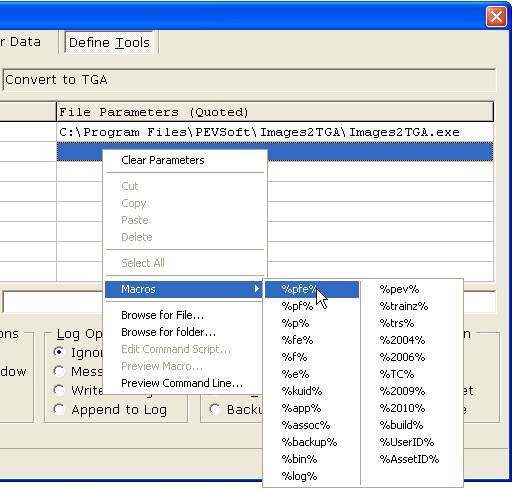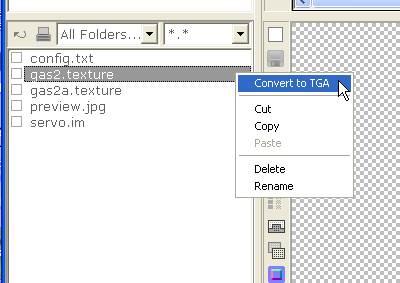AssetX/Tutorial Define Tools
(First version) |
(Images added) |
||
| Line 1: | Line 1: | ||
Any program can be connected to the AssetX program to be used as a tool within AssetX. | Any program can be connected to the AssetX program to be used as a tool within AssetX. | ||
| + | |||
In this tutorial we will conect PEVs Images2TGA tool to open a N3V binary texture (*.texture). | In this tutorial we will conect PEVs Images2TGA tool to open a N3V binary texture (*.texture). | ||
| + | |||
Firstly ensure that you have Images2TGA installed on the same PC as AssetX. | Firstly ensure that you have Images2TGA installed on the same PC as AssetX. | ||
| + | |||
Open a built-in item for edit in TS12 (or TS2009, TS2010), and ensure that there is a *.texture file present for later testing. | Open a built-in item for edit in TS12 (or TS2009, TS2010), and ensure that there is a *.texture file present for later testing. | ||
| − | Launch AssetX and select "Configure Tools" from the "Options" menu as in Fig 1 below. | + | Launch AssetX and select "Configure Tools" from the "Options" menu as in Fig 1 below. |
| + | |||
| + | |||
| + | Fig 1<br> | ||
| + | [[File:AssetX_Tutorial1_Image1.jpg]] | ||
| − | |||
The "Define Tools" tab page of the options window will open as shown in Fig 2 below. | The "Define Tools" tab page of the options window will open as shown in Fig 2 below. | ||
| − | Fig 2 | + | |
| + | Fig 2<br> | ||
| + | [[File:AssetX_Tutorial1_Image2.jpg]] | ||
| + | |||
| + | |||
There is a drop-down box in the top left of the window named "Menu:". Click on the drop-down arrow to display the list of available menu locations, as in Fig 3 below. | There is a drop-down box in the top left of the window named "Menu:". Click on the drop-down arrow to display the list of available menu locations, as in Fig 3 below. | ||
| − | Fig 3 | + | |
| + | Fig 3<br> | ||
| + | [[File:AssetX_Tutorial1_Image3.jpg]] | ||
| + | |||
| + | |||
Note that the list shows Menus and file types. The file types, when selected, add the new item to the Right Click menu for when that file type is selected in the AssetX File List. | Note that the list shows Menus and file types. The file types, when selected, add the new item to the Right Click menu for when that file type is selected in the AssetX File List. | ||
| Line 28: | Line 42: | ||
Right Click on the highlighted section immediately below the words "Filemask: *.texture" and select "Rename Item" from the pop-up menu, as in Fig 4 below. | Right Click on the highlighted section immediately below the words "Filemask: *.texture" and select "Rename Item" from the pop-up menu, as in Fig 4 below. | ||
| − | Fig 4 | + | |
| + | Fig 4<br> | ||
| + | [[File:AssetX_Tutorial1_Image4.jpg]] | ||
| + | |||
| + | |||
| + | |||
A Data entry window will open to allow entry of an action name. Enter "Convert to TGA" here and click on "OK" to accept, as in Fig 5 below. | A Data entry window will open to allow entry of an action name. Enter "Convert to TGA" here and click on "OK" to accept, as in Fig 5 below. | ||
| − | Fig 5 | + | |
| + | Fig 5<br> | ||
| + | [[File:AssetX_Tutorial1_Image5.jpg]] | ||
| + | |||
| + | |||
"Convert to TGA" will now appear at the left below "Filemask: *.texture". Note also that the Menu Caption box says "Convert to TGA". See Fig 6 below. | "Convert to TGA" will now appear at the left below "Filemask: *.texture". Note also that the Menu Caption box says "Convert to TGA". See Fig 6 below. | ||
| − | Fig 6 | + | |
| + | Fig 6<br> | ||
| + | [[File:AssetX_Tutorial1_Image6.jpg]] | ||
| + | |||
We have now defined where our tool will appear and what it's called. We now choose the program we want to run as a tool. | We have now defined where our tool will appear and what it's called. We now choose the program we want to run as a tool. | ||
| − | |||
| − | the first vacant location and select "Browse for File" from the pop-up menu, as shown in Fig 7 below. | + | At the upper-right of the Options window we see a vacant list under the heading "File Parameters (quoted)". In the list Right Click on the first vacant location and select "Browse for File" from the pop-up menu, as shown in Fig 7 below. |
| + | |||
| + | |||
| + | Fig 7<br> | ||
| + | [[File:AssetX_Tutorial1_Image7.jpg]] | ||
| + | |||
| − | |||
In the Select File dialogue, now presented, navigate to find the Images2TGA.exe program and select it. See Fig 8 below. | In the Select File dialogue, now presented, navigate to find the Images2TGA.exe program and select it. See Fig 8 below. | ||
| − | Fig 8 | + | |
| + | Fig 8<br> | ||
| + | [[File:AssetX_Tutorial1_Image8.jpg]] | ||
| + | |||
| + | |||
Note that the full file path to Images2TGA.exe now appears in the File Parameters List. | Note that the full file path to Images2TGA.exe now appears in the File Parameters List. | ||
| − | Now to choose what file we want to open with Images2TGA. A set of built-in macros define pathes, files, and extensions. Click on the | + | Now to choose what file we want to open with Images2TGA. A set of built-in macros define pathes, files, and extensions. Click on the "Legend" button at the bottom of the Options Window to see the choices for these macros. In this case we need the '''full file path, filename and extension''' to be defined. Right Click on the second box in the File Parameters List and select '''Macros''' then '''%pfe%''' (for path, filename, extension) from the list offered. See Fig 9 below. |
| + | |||
| + | |||
| + | Fig 9<br> | ||
| + | [[File:AssetX_Tutorial1_Image9.jpg]] | ||
| + | |||
| + | '''%pfe%''' will appear in the File Parameters List. '''%pfe%''' gives us the file presently selected in the ''AssetX File List''. | ||
| − | + | Note that we have not put ant data in the '''Switches''' column. The use of this is explained later (TBD). | |
| − | + | We can check the command line that this sets up creates by right clicking on the File Parameters List and selecting '''Preview Command Line''' from the pop-up menu. | |
| − | + | Now we can close the Options window by CLicking on the "OK" Button. This closes and SAVES the data we have entered to in program INI file. Any other exit method will not save the data. | |
| − | + | Now when we go to the AssetX File List and Right Click on a *.texture file we get the Convert to TGA Option in the pop-up menu as in Fig 10 below. | |
| − | + | Fig 10<br> | |
| + | [[File:AssetX_Tutorial1_Image10.jpg]] | ||
| − | |||
| − | + | Clicking on this option will open Images2TGA to display the selected texture file. It can be converted to TGA by just saving as a TGA. | |
| − | + | === Return to AssetX Tutorials Page === | |
| − | + | [[Tutorials_for_AssetX_and_PEV_Tools]] | |
Revision as of 23:24, 11 November 2012
Any program can be connected to the AssetX program to be used as a tool within AssetX.
In this tutorial we will conect PEVs Images2TGA tool to open a N3V binary texture (*.texture).
Firstly ensure that you have Images2TGA installed on the same PC as AssetX.
Open a built-in item for edit in TS12 (or TS2009, TS2010), and ensure that there is a *.texture file present for later testing.
Launch AssetX and select "Configure Tools" from the "Options" menu as in Fig 1 below.
The "Define Tools" tab page of the options window will open as shown in Fig 2 below.
There is a drop-down box in the top left of the window named "Menu:". Click on the drop-down arrow to display the list of available menu locations, as in Fig 3 below.
Note that the list shows Menus and file types. The file types, when selected, add the new item to the Right Click menu for when that file type is selected in the AssetX File List.
In this case we choose "*.texture* and *.texture will be displayed in the "Menu:" drop-down box.
Now we give a name to the action we propose for the new tool.
Right Click on the highlighted section immediately below the words "Filemask: *.texture" and select "Rename Item" from the pop-up menu, as in Fig 4 below.
A Data entry window will open to allow entry of an action name. Enter "Convert to TGA" here and click on "OK" to accept, as in Fig 5 below.
"Convert to TGA" will now appear at the left below "Filemask: *.texture". Note also that the Menu Caption box says "Convert to TGA". See Fig 6 below.
We have now defined where our tool will appear and what it's called. We now choose the program we want to run as a tool.
At the upper-right of the Options window we see a vacant list under the heading "File Parameters (quoted)". In the list Right Click on the first vacant location and select "Browse for File" from the pop-up menu, as shown in Fig 7 below.
In the Select File dialogue, now presented, navigate to find the Images2TGA.exe program and select it. See Fig 8 below.
Note that the full file path to Images2TGA.exe now appears in the File Parameters List.
Now to choose what file we want to open with Images2TGA. A set of built-in macros define pathes, files, and extensions. Click on the "Legend" button at the bottom of the Options Window to see the choices for these macros. In this case we need the full file path, filename and extension to be defined. Right Click on the second box in the File Parameters List and select Macros then %pfe% (for path, filename, extension) from the list offered. See Fig 9 below.
%pfe% will appear in the File Parameters List. %pfe% gives us the file presently selected in the AssetX File List.
Note that we have not put ant data in the Switches column. The use of this is explained later (TBD).
We can check the command line that this sets up creates by right clicking on the File Parameters List and selecting Preview Command Line from the pop-up menu.
Now we can close the Options window by CLicking on the "OK" Button. This closes and SAVES the data we have entered to in program INI file. Any other exit method will not save the data.
Now when we go to the AssetX File List and Right Click on a *.texture file we get the Convert to TGA Option in the pop-up menu as in Fig 10 below.
Clicking on this option will open Images2TGA to display the selected texture file. It can be converted to TGA by just saving as a TGA.

